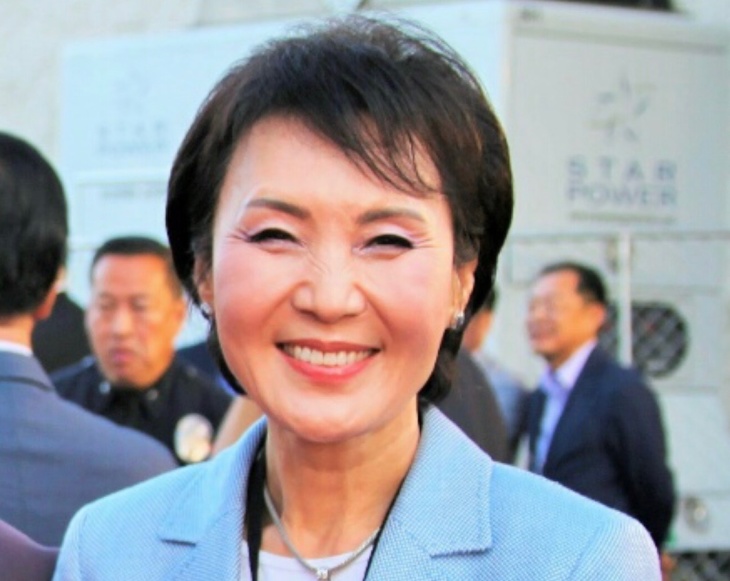
When BCD Tofu House founder Hee Sook Lee arrived in Los Angeles in 1989, she didn't come to launch a Korean restaurant empire. Or to sell BCD soup starter kits at H-Mart. Or to create a cultural touchstone for Korean kids growing up in L.A. She came to the United States so her children could master English.
Lee was used to putting others first. When she was in middle school, her father suffered a stroke so Lee had skipped college to work. She wanted to help her mother who had been washing dishes in restaurants and selling wares in the flea market to support her four daughters. Lee was the second oldest but, according to family lore, the most responsible so her mother told her, "You are the son of the family now."
Years later and living in the U.S., Lee was in her 30s, married to a successful restaurateur and busy raising their three sons but she yearned for a career of her own. After studying graphic design at Santa Monica College and diamond-grading, she had an idea.
"Many Korean immigrants were creating successful restaurant businesses here," Lee said in an interview for Seoul of LA. "I felt confident that I could do well with this business if I worked with Korean food."
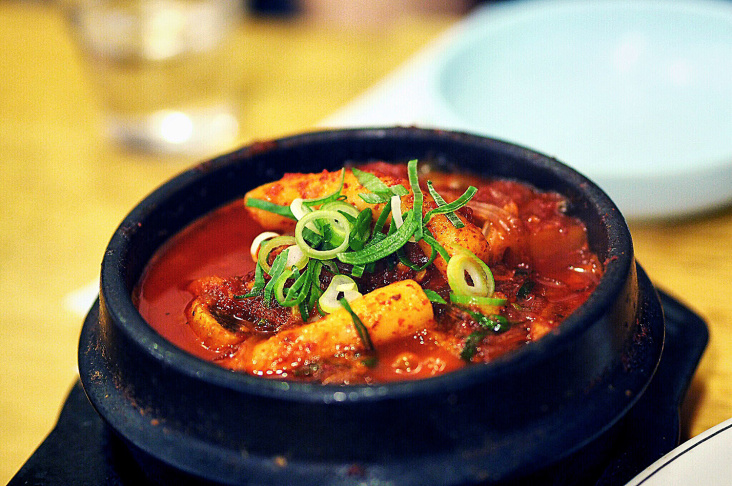
"NO MIDDLE GROUND"
Lee died July 18 at age 61 after a six-year-long battle with ovarian cancer.
Her oldest son, Dr. Eddie Lee, has taken over for his mom as interim CEO. Trained as an internist, he has spent the last three years working part-time as a physician so he could serve as BCD's vice president. In 2019, he ramped up his BCD duties to full-time. Without knowing it, he had been apprenticing under his mother for two decades, watching as she grew a single restaurant into an international brand.
Eddie describes his mom as a social introvert but one who enjoyed playing host and bringing the Koreatown community together through food. She was also a "passionate perfectionist" who delighted over perfectly-seasoned kimchi and a savvy business owner to haggle over everything from produce prices to contracts and rents.
"She has a very gentle smile but behind that, she has nerves of steel. She's one of the best negotiators I've ever seen," Eddie says.
Her first daring leap was the decision to build her business around soondubu jjigae, a bubbling stew of silken tofu in a fiery broth reddened by gochujang. BCD servers will ask what spice level you prefer, from mild to rip-out-your-sinuses-hot, which some claim to blast away any nascent colds and incipient hangovers.
In many Seoul restaurants, soondubu is as ubiquitous as "chicken tenders and french fries or spaghetti bolognese," says Daniel Lee Gray, who operates food tours throughout South Korea.
"It's like down-home food," said Cecilia Hae-Jin Lee, chef and author of Quick & Easy Korean Cooking: More Than 70 Everyday Recipes. "You make it to have something warm and spicy in the winter. This isn't what you serve to guests."
Soondubu is a humble dish but Lee believed she could sell it in the U.S. as the main event.
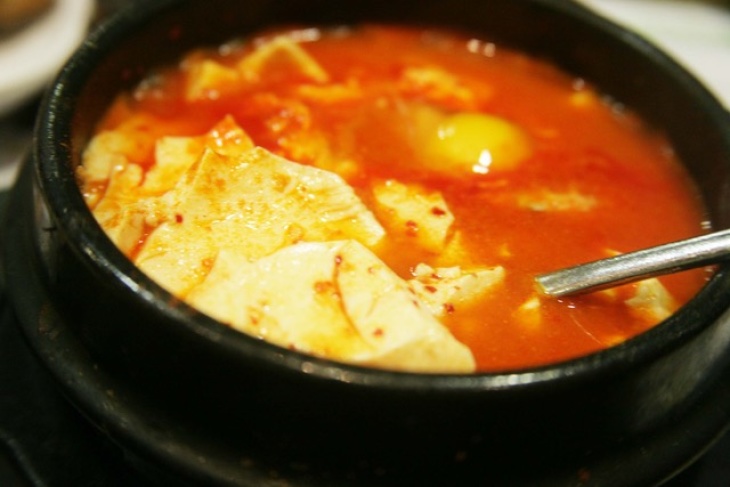
According to her son Eddie, the proverbial lightbulb went off one Sunday during church.
He and his brothers would get hungry while sitting in the pews of the Berendo Street Baptist Church. After the service, they would clamor to go to a nearby restaurant for soondubu.
"Every Sunday, we would always want to eat there," Edward recalls. "And she was like, 'Oh, that's interesting.'"
In 1996, Lee opened her first BCD Tofu House on Vermont Avenue in Koreatown. There, she fine-tuned her secret combination of broth and seasonings.
At the time of the launch, the family was temporarily living in Las Vegas. Being in another city didn't stop Lee from overseeing every aspect of her new business.
For the first year, she commuted almost daily between Vegas and Los Angeles, Eddie recalls. In the morning, Lee would catch the first Southwest flight from Vegas to LAX. As soon as she landed, she would drive to a downtown L.A. market to pick out her vegetables then show up at BCD to work in the restaurant. At night, she'd fly back to Vegas.
"I literally didn't see her for a year," Eddie says. "That's just my mom. When she does something, it's like there's no middle ground. You do it all the way."
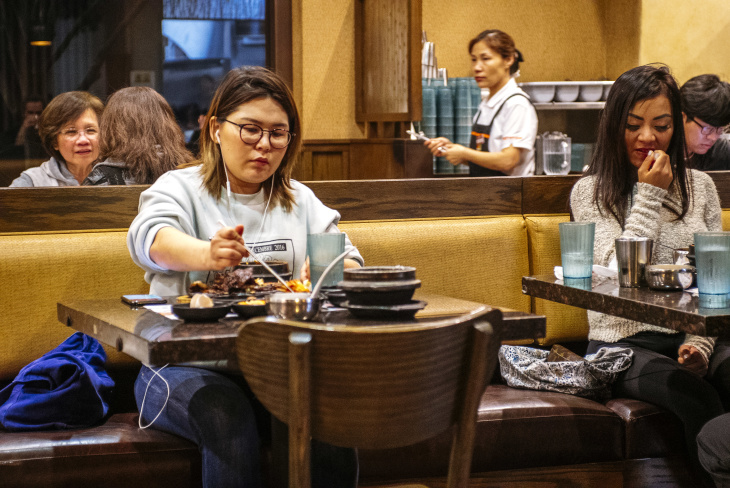
GOING 24/7
Lee had named her restaurant after Buk Chang Dong, the Seoul neighborhood where her husband's aunt had owned a soondubu restaurant. Her husband, Tae-Ro, a lawyer-turned-businessman always supported his wife's ventures, even as her restaurants eclipsed his. He was a big help as she tested foods in the kitchen.
"They're really, really close partners but I think they just kind of decided early on to not butt heads. My dad has his restaurants in Korea, a few restaurants in Las Vegas. And my mom had her thing. That's a very smart and wise decision they made early on in their marriage," Eddie says.
Today, the bright green and orange BCD logo can be spotted at 13 restaurants, most of them in California -- including Torrance, Irvine and Fullerton -- along with a few in Texas, New Jersey and New York.
The outpost on Wilshire Boulevard -- the third and most famous BCD Tofu House -- opened in 2000 and became wildly popular, in part, because Lee kept it open 24 hours a day. Even during the coronavirus pandemic, it continues to offer take-out at all hours.
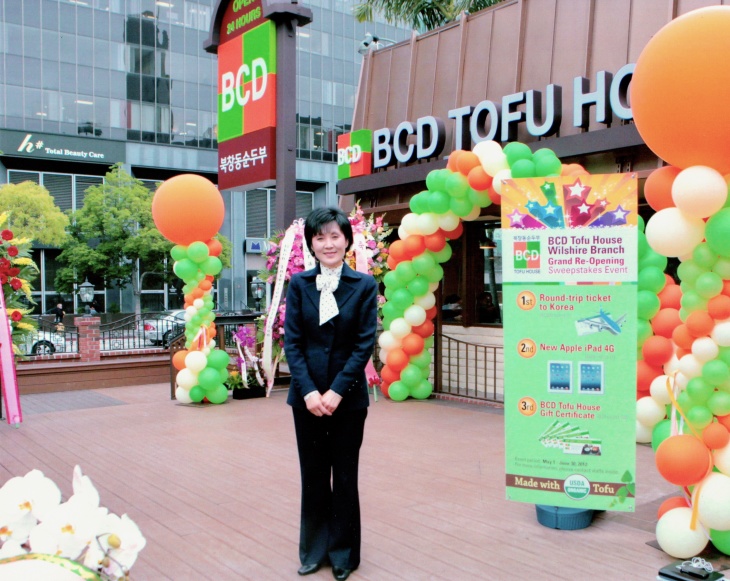
Edward Lee says when his mom told her family about the possibility of going 24/7, everyone was skeptical. Would many people want to eat Korean food late at night? Wouldn't they prefer a burger or maybe a plate of eggs and hashbrowns at Denny's?
Lee pushed back.
"She said a lot of Korean people work late. There are a lot of Koreans who work in the garment industry, and they work really odd hours, who just need a place to eat, late at night or early in the morning," Eddie says.
The BCD sign glowed into the night and garment workers weren't the only ones drawn to it.
Noah Cho, a food columnist for Catapult, recalls visiting the Wilshire location as a college kid in the late 1990s, at the peak of the AZN pride scene.
"It would be jampacked. It was old-school ravers, wearing baggy JNCO jeans with a white tank top with a visor. Like I had dyed-blond hair and green contacts. It was that look," Cho says.
At first, the late-night BCD crowd was predominantly Asian but that started to change as Korean kids at UCLA and USC brought their non-Asian friends to the restaurant after a night of clubbing or bar-hopping.
The late hours also drew restaurant and bar employees from outside Koreatown.
"You could get a really good, soul-restoring bowl of soup to finish your night. As industry people started finding it, word-of-mouth about it started coming out a little bit more," Cho says.
Daniel Gray Lee says his food tours in Seoul would attract Americans who had been to BCD restaurants in Los Angeles and insisted on going to the one in Seoul, which they thought was the original.
Lee had to break it to them that BCD was actually a Korean American brand that had only opened locations in Asia after finding success in the U.S. (The locations in Tokyo and Seoul have since closed.) He learned how BCD had served as an introduction to Korean culture for some of his clients.
"After BCD, they would want to try other restaurants. They would want to watch Korean TV shows. It made them want to come to Korea," Lee says.
BCD also won fans thanks to Lee's savvy business decisions. For one thing, the price point was always good. Today, a bowl of soondubu and all the sides runs you about $14.
The banchan plunked down by servers is so plentiful, you can get full on it before the main course arrives.
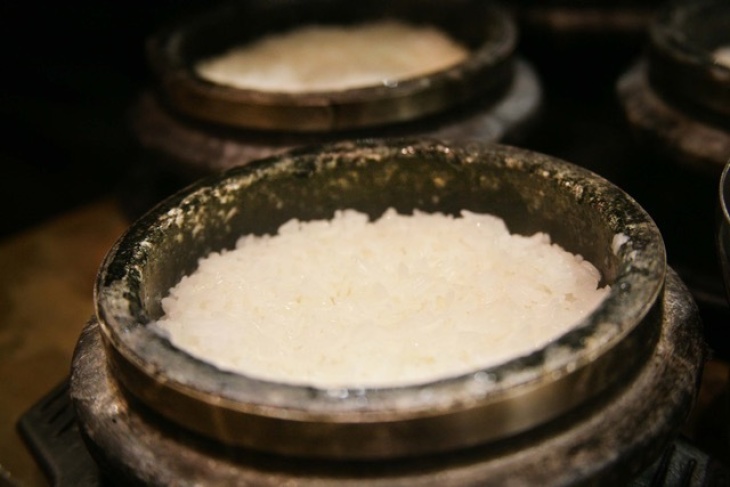
Cecilia Hae Jin Lee says BCD's soondubu wasn't the most celebrated --- that distinction would probably go to Beverly Soon Tofu, featured by the late Anthony Bourdain on his CNN show Parts Unknown -- but BCD had a reputation for consistency, quality and flourishes such as having servers scrape the bottom of a bowl of stone-pot rice.
"You'd have the crispy, burnt rice bits at the bottom, and then they pour hot water in and make nurunji, which is super old-school and very Korean. It made her restaurant feel special," Cecilia Hae Jin Lee says.
Eddie Lee says his mom was always looking for ways to distinguish her restaurants from the competition. For instance, the soondubu came with jogi -- a whole, fried yellow croaker fish.
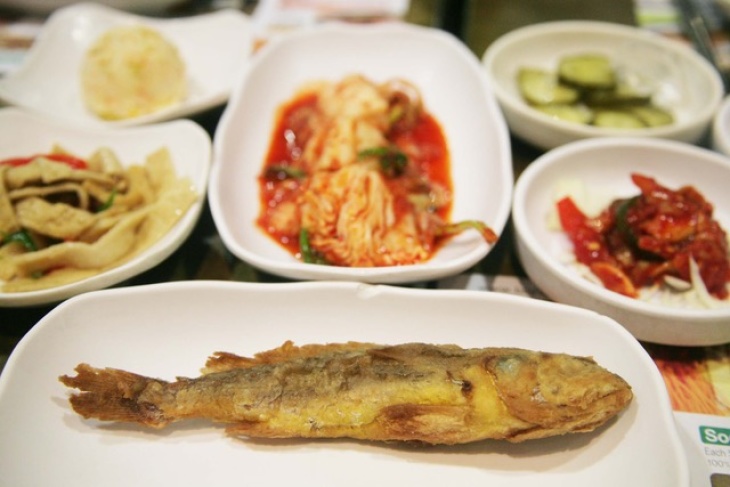
If imitation is the sincerest form of flattery, Lee is a culinary pioneer. With BCD Tofu House, she created a format that restaurants around the country have copied. For many Korean Americans, the brand remains a favorite and its soondubu is a beloved comfort food.
Writer Katherine Kim says after she recently finished interviewing an elderly homeless couple in her job as senior communications editor for Koreatown Youth + Community Center, she asked them where she could treat them to lunch. The wife instantly requested the BCD Tofu House on Western.
"When we went there, it was clear that she had been a patron for a long time because the waitstaff knew her and the manager knew her. It was a place where she had a full meal again. She said this was just such a treat for her," Kim says.
In 2013, BCD's image took a hit when the chain and Hee Sook Lee were named in a class action lawsuit filed by hundreds of employees who alleged they had experienced wage theft. A 2015 settlement awarded $3 million to the workers.
Eddie Lee describes the lawsuit as a difficult time for his mother.
"As she focused so much on growth [of the company], there was a lot on the back end, the human resources, that had lagged behind the growth of the business. And I think there were some mistakes," Lee says.
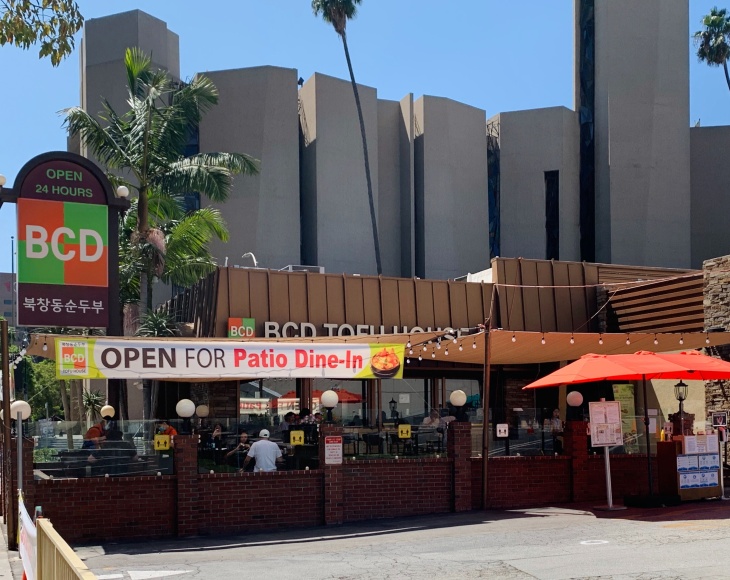
He says his mother has cared deeply for her employees and notes the company has continued to provide health benefits to its employees, including those who have been laid-off, during the COVID-19 pandemic. According to Eddie, BCD has used some of the money it received from a PPP loan to keep servers' wages at their pre-pandemic level, including what they would've made in tips.
For BCD fans, the lawsuit was a distant memory, if they knew about it at all. After learning of Lee's death, they paid tribute to her on social media, praising her contributions to the culinary scene, to the Korean American community and to Southern California.
Not only does BCD hold a special place of honor among the Korean diaspora, it has also captured the popular imagination of people in South Korea. Check out the celebs on Korean variety shows.
"When they're talking about visiting the U.S. and coming to L.A., they say that you have to make a stop at BCD," writer Katherine Kim explains. "It's definitely L.A. It's very SoCal."
It was always a happy surprise when Korean celebrities showed up at the restaurant but it also made perfect sense. After Parasite won Best Foreign Language Film at the 2020 Golden Globes, Bong Joon Ho and his team ended up at the BCD outpost on Wilshire.
Daniel Lee Gray, who has lived in Korea for approximately two decades, said Hee Sook Lee had become famous in her native land because of BCD's success in the United States.
"There's so much pride there when someone is able to do that overseas. It just makes people very proud of their culture and their traditions," Grey says.
In the Korean American community, Lee was known as much for her charity work as for her business savvy.
She helped lead the non-profit Global Children Foundation, which started by providing relief to poor children living in South Korea but expanded to provide services around the world.
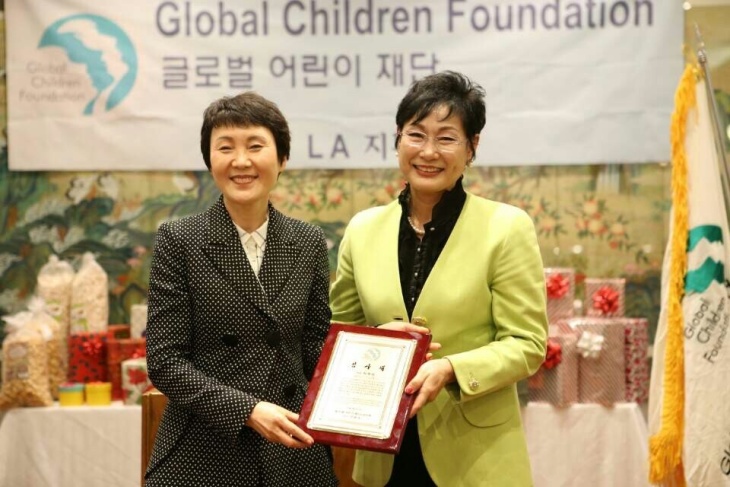
Locally, BCD has donated meals. In May, the chain worked with KYCC to provide 80 meals to low-income seniors. With the pandemic showing no signs of ebbing, there are plans to revive the partnership.
Lee also made an effort to support civic life, contributing to Korean American politicians of both major parties.
Orange County Supervisor Michelle Steel befriended Lee in 2003, when she was pulling together a group of prominent Korean American to meet Carly Fiorina, then the CEO of Hewlett Packard.
Long after Fiorina's bids for the U.S. Senate and the presidency ended, this group of Korean American women met monthly, calling themselves "Carly's Girls."
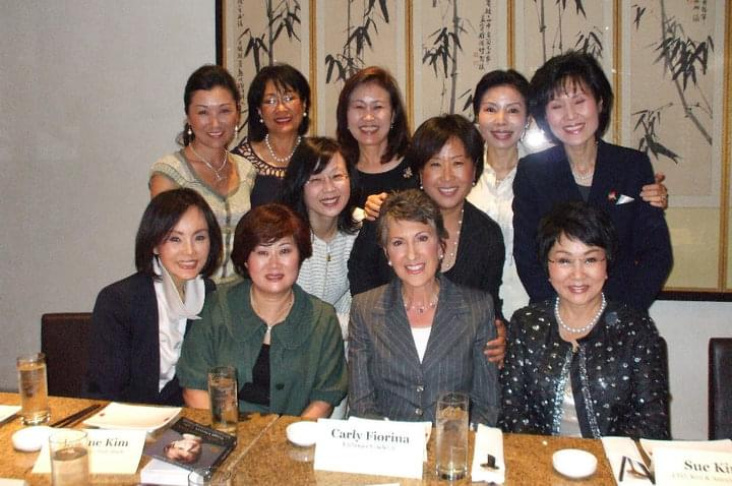
Steel, who is garrulous and outgoing, was immediately drawn to the quieter Lee. They discovered their birthdays were three days apart and started celebrating them together.
"She was always giving -- and not just love. She would bring little lipsticks or tofu or fermented fish," Steel says.
After Lee was diagnosed with cancer six years ago, she continued to attend many of the "Carly's Girls" meals. In fact, Steel didn't know about her friend's diagnosis until three years into Lee's battle with cancer.
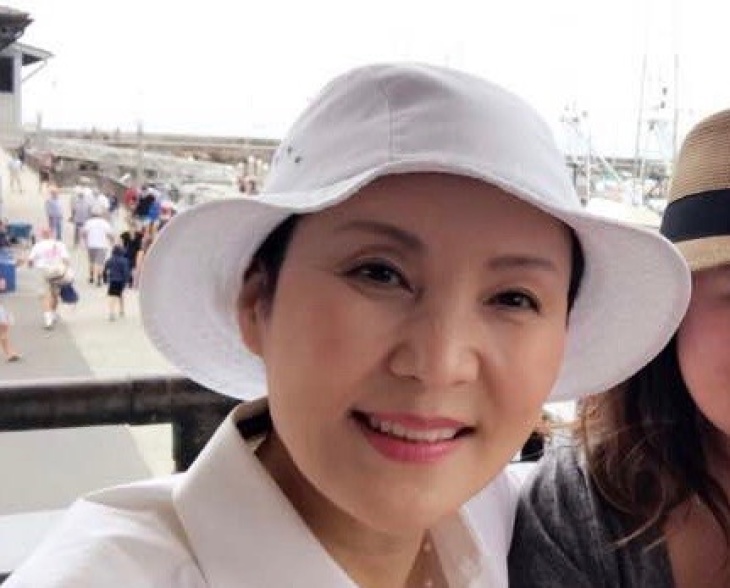
Steel says Lee made an effort to live life more loudly after her diagnosis -- quite literally, singing karaoke instead of smiling in the corner.
"I didn't know she was in pain at all because she never told us that she was in pain," Steel says.
In the last three years, as Lee's family members convinced her to step back from the business and focus on her health, Eddie took on more of the day-to-day duties. His mother, however, still liked to visit the restaurants.
"She loved interacting with customers. The Korean community is really pretty small. So, often at the restaurant, she'd see someone she knew from church or someone from the gym or someone from another business," he says.
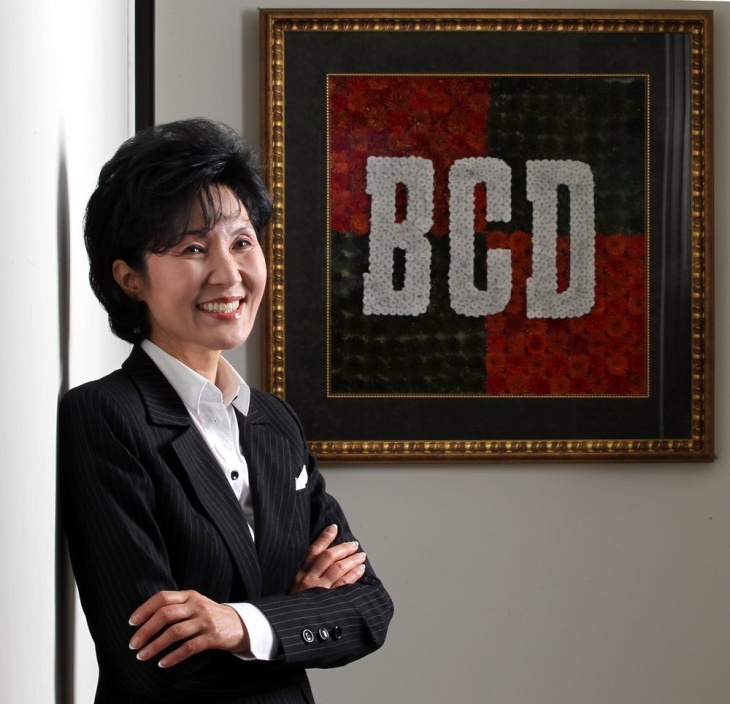
She would go to their table to greet them in Korean and send over complimentary dishes.
Today, Eddie is the only son in the family business. His brothers work in finance in New York.
He is still processing his mother's death. If she were alive, he says she'd be thinking about where to open the next BCD location. (They had come close a few times in recent years to choosing a spot in the Bay Area.) She'd also be thinking of more ways to innovate.
"We'd go to any restaurant and we'd always be critiquing the food. She'd always be thinking, what's next? What's the next trend?" Eddie says.
She thought so much about BCD, the family would tease her.
"The running joke was she actually has four sons and that her restaurant BCD is actually our youngest brother," Eddie says.
That "brother" isn't so little anymore but Eddie has made it his job to look after his mother's baby for her.
Our news is free on LAist. To make sure you get our coverage: Sign up for our daily newsletters. To support our non-profit public service journalism: Donate Now.
"stage" - Google News
August 15, 2020 at 11:17AM
https://ift.tt/2Y5eUK6
Under High Demand, California Declares Stage 3 Power Emergency, Then Lifts It. What You Need To Know - LAist
"stage" - Google News
https://ift.tt/2xC8vfG
https://ift.tt/2KXEObV
Bagikan Berita Ini















0 Response to "Under High Demand, California Declares Stage 3 Power Emergency, Then Lifts It. What You Need To Know - LAist"
Post a Comment